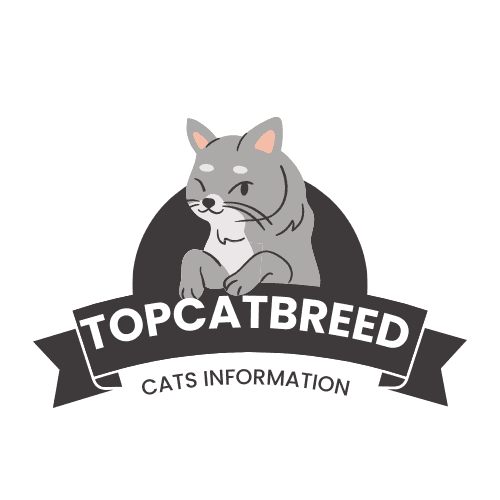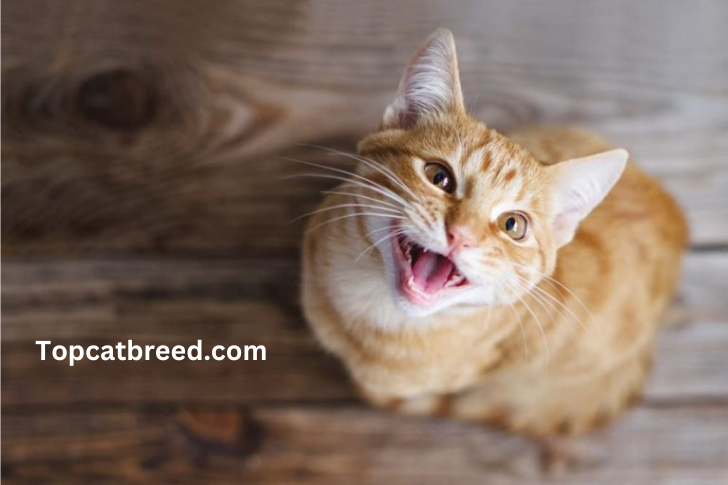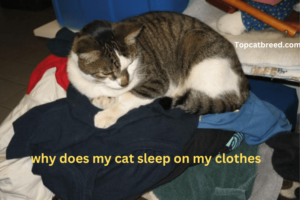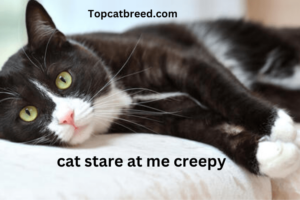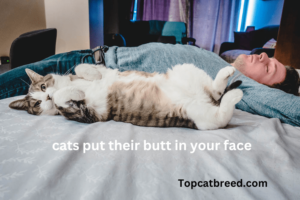“Have you ever wondered why your cat meows after eating? It’s a common question for cat owners. Cats are known for their meowing, and right after a meal, they may do it for various reasons. It could be a sign that your cat is in pain, confused, or simply wants more food. On the flip side, it might indicate satisfaction with their meal. Additionally, meowing after eating could be a signal that your cat is feeling discomfort due to issues like kidney failure or temperature sensitivity.If you’ve ever wondered, ‘Why does my cat meow after eating?’ or had similar questions, you’re in the right place for answers.”
In this article, we’ll look at ten simple reasons for this behavior, explaining why your cat meows after eating and how to make mealtimes enjoyable for both you and your furry friend. Join us as we explore the fascinating world of cat behavior, unraveling the mysteries behind this curious habit. Our goal is to share insights that connect with cat owners, making mealtime a positive experience for you and your beloved cat.
10 REASONS CATS MOEW AFTER EATING
1-Your Cat Is Satisfied With Their Meal
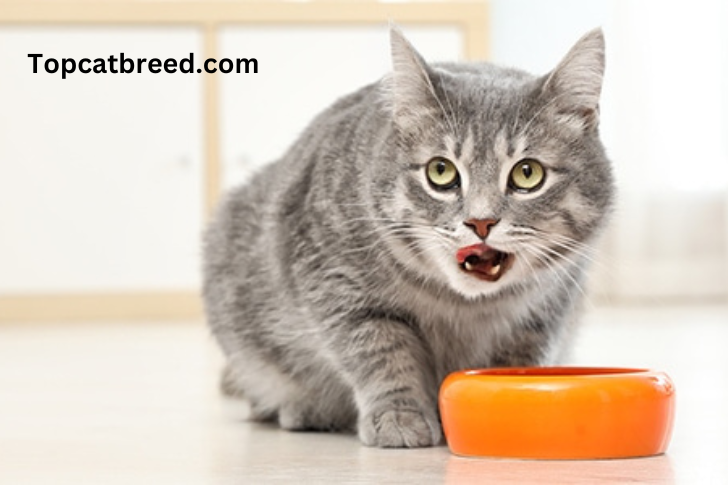
When your cat meows after eating, it’s often a sign of contentment. Just as we might express our satisfaction after a tasty dinner, cats have their way of saying, “I enjoyed that meal.” Post-meal meowing, accompanied by purring and relaxed body language, is their way of complimenting the chef, in this case, you.
This type of meowing is usually a positive, happy expression, indicating that they found their meal delightful. As a cat owner, this melodic affirmation is a rewarding experience, affirming your role as a provider of delicious and satisfying meals. It’s a simple but profound way for your cat to communicate their approval and delight, creating a bond of mutual understanding and appreciation between you and your beloved pet.
2. Your Cat Is in Pain
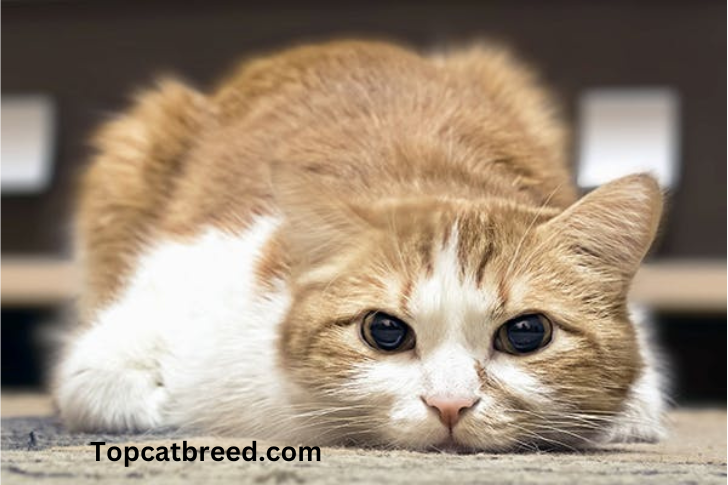
Conversely, meowing after eating might signal discomfort or pain. Dental issues, throat problems, or internal discomfort can lead to post-meal meowing. When your cat exhibits unusual and persistent behaviors like meowing after meals, it’s their way of communicating that something might be wrong.
Consulting your veterinarian is crucial in such cases to rule out any underlying health concerns and ensure your cat’s well-being. Dental problems, gum infections, or oral sores can make eating painful. If your cat exhibits post-meal distress, potential sources of pain could stem from gastrointestinal issues or inflammatory conditions.
Taking steps to understand and alleviate your cat’s discomfort is crucial for their overall well-being. If you observe signs of pain or discomfort, such as growling behavior, seeking a comprehensive veterinary examination is the most appropriate course of action. Veterinarians can identify the cause, recommend necessary tests, and provide appropriate treatment options. Promptly addressing your cat’s pain contributes to a happier and healthier life, ensuring they can lead a comfortable and content existence.
3. The Food Tastes Bad to Your Cat
Cats are known for their discerning palates. After a meal, if your cat vocalizes dissatisfaction, it might be expressing its dislike for the food. Cats are discerning about flavors and textures, and if the meal doesn’t meet their expectations, they’ll communicate their displeasure through meowing. To address this, consider trying different cat food options to see if their meowing subsides.
Finding food that suits their taste while providing essential nutrients is the key. As a responsible cat owner Finding a balance between taste and essential nutrients is crucial for your cat’s well-being and ensuring a peaceful mealtime. Keep an eye on their food preferences, adapting to their taste for a content and enjoyable dining experience.
4. Your Cat Is Confused
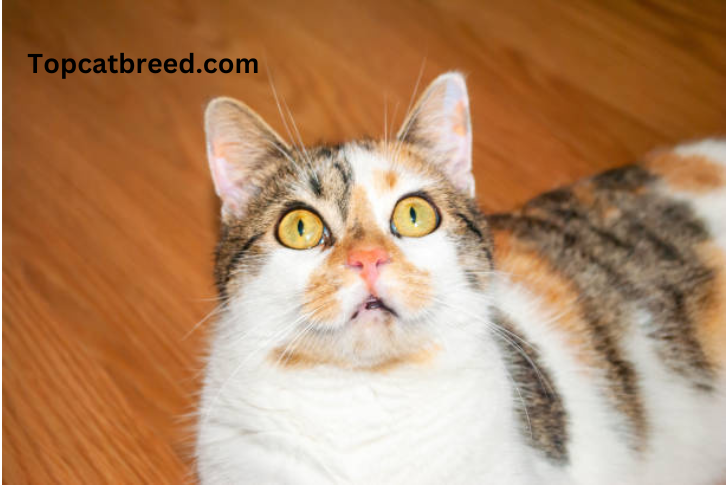
Confusion can also lead to post-meal meowing. Changes in the environment, such as new feeding locations or food bowls, can leave your cat bewildered. In such cases, meowing expresses, “This is different, and I’m not sure what to make of it.” To reduce confusion-related meowing, introduce changes gradually.
Cats thrive on routine, and disruptions during mealtimes can cause discomfort. As a considerate pet owner, you can help alleviate your cat’s confusion by maintaining a regular feeding schedule and providing meals in a familiar, quiet, and undisturbed location. By doing so, you offer your feline companion a sense of security and predictability, reducing confusion and the associated meowing. Your efforts to maintain a stable routine will contribute to a more content and relaxed cat .Ensure your cat feels secure and familiar in their mealtime setting to minimize confusion and meowing.
5. Your Cat Wants More Food
One of the simplest reasons for post-meal meowing is that your cat is still hungry. If you’ve ever added extra kibbles to stop the meowing, you’re aware of its effectiveness. To avoid overfeeding, maintain a regular feeding schedule and measure portions accurately. Overindulging can lead to obesity, a common issue in cats. So, it’s essential to follow feeding guidelines and resist the temptation to overfeed your furry friend.
As a responsible cat owner Recognizing and responding to your cat’s hunger signals is a vital responsibility for any cat owner. By appropriately portioning their meals, you strike a crucial balance between meeting their appetite and safeguarding against obesity and related health concerns. This conscientious approach not only ensures your cat’s well-being but also contributes to their overall longevity and happiness.
6-Gas Movements In Your Cat
Gas movements within your cat’s digestive system can be an uncomfortable experience, leading to post-meal meowing as an attempt to seek relief. Gas can result from various factors, including dietary choices or the ingestion of air during meals. Cats with sensitive stomachs or those prone to gas may find post-meal discomfort unsettling, prompting them to vocalize their unease.
To address this issue, you can consider adjusting your cat’s diet to minimize potential gas-inducing foods. Opting for high-quality, easily digestible cat food can help reduce the likelihood of gas-related discomfort. If the problem persists, consulting with your veterinarian is advisable to rule out any underlying digestive issues.
ALSO READ .Why does my cat yowling after eating? 6 reasons
7-Your Cat Feels Temperature
Cats are renowned for their love of warmth and comfort. Post-meal meowing due to temperature discomfort may signal that your cat is feeling too hot or too cold. Cats are highly sensitive to temperature changes, and this can affect their overall comfort during and after meals.
Ensuring that your cat’s dining area is situated in a cozy, temperature-regulated environment can mitigate their post-meal vocalizations. Cats thrive in warm, comfortable surroundings, and maintaining an ideal temperature during mealtime can contribute to their overall satisfaction and contentment. This attention to their comfort enhances their dining experience and minimizes post-meal meowing related to temperature discomfort.
8-YOUR Cat Wants Attention From You
Cats are known for their social and interactive nature. If your cat meows after a meal, it’s often a clear sign that they’re seeking your attention. This post-meal meowing is their way of saying, “I’ve had my meal, and now I want some quality time with you.” It’s a manifestation of their desire to connect and interact with their favorite human.
This form of meowing often comes hand in hand with other affectionate behaviors like rubbing against your legs, kneading, or loud purring. Your cat’s aim is to connect with you and become the focal point of your attention. Responding to their desire for interaction not only deepens your bond but also satisfies their social and emotional requirements. Understanding and reciprocating these displays of affection contribute to a mutually enriching relationship between you and your feline companion.
Spending quality time with your cat, whether through play or cuddles, is a fantastic way to reciprocate their affection.
9-There Is an Underlying Illness In Your Cat
While post-meal meowing is often harmless and benign, it’s essential to remain vigilant for any unusual or excessive vocalization. If your cat’s meowing becomes persistent and is accompanied by concerning symptoms such as changes in appetite, weight loss, or lethargy, it might indicate an underlying illness. In such cases, it’s essential to promptly consult your veterinarian.
Some health issues can reveal themselves through increased vocalization, particularly after meals. Early diagnosis and treatment are crucial for your cat’s well-being. Regular veterinary check-ups and vigilant observation of your cat’s behavior contribute to detecting and addressing potential health problems before they worsen. Prioritizing your cat’s health and taking swift action can significantly impact their prognosis.
10-Kidney Failure May Be On the Horizon For Your Cat
When your cat persistently meows after eating, it can also be a subtle sign that kidney issues could be looming. Kidney disease is a common health concern in older cats, and changes in behavior, including post-meal meowing, can sometimes be indicative of this condition.
The kidneys serve a crucial function in filtering waste from the bloodstream and sustaining vital bodily processes. As kidney function diminishes, the accumulation of waste products can result in discomfort and alterations in behavior.
If your cat exhibits post-meal meowing along with signs such as heightened thirst, frequent urination, weight loss, and appetite changes, prompt consultation with your veterinarian is essential. Early identification and effective management of kidney disease can markedly enhance your cat’s overall quality of life.
Is it normal for cats to meow after they have eaten?
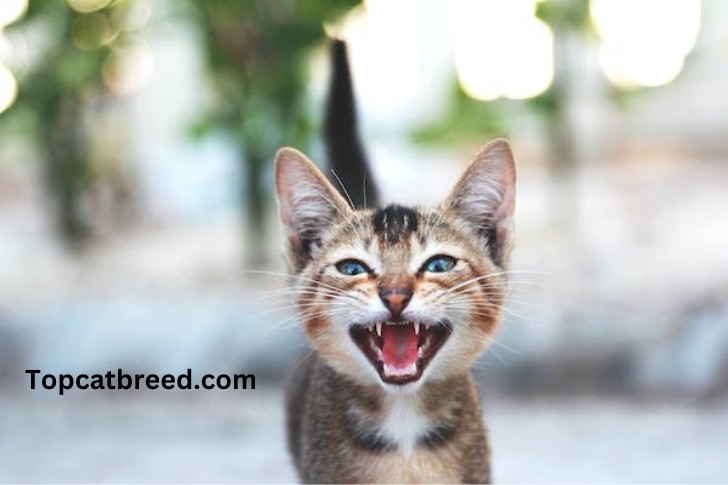
Cats are talkative creatures, and meowing is a typical way they communicate. It’s common for some cats to meow after eating, usually not a cause for concern. However, it’s essential to consider specific factors when evaluating this behavior. Paying attention to changes and understanding your cat’s communication contributes to a healthy and communicative bond.
Habitual Meowing: Some cats develop the habit of meowing before, during, or after eating. This behavior is often an expression of excitement or anticipation.
Seeking Attention: Cats may meow after a meal to seek attention. They enjoy interacting with their human companions and might use vocalization as a way to engage you in play or affection.
Expressing Satisfaction: Content and well-fed cats may meow as a sign of comfort and satisfaction. It’s their way of saying, “I thoroughly enjoyed that meal!”
Individual Variation: Each cat is unique, and what’s normal can vary from one feline to another Some cats are naturally more loud than others.
Health Considerations: Post-meal meowing in cats is generally a common and harmless behavior. However, cat owners should be attentive to sudden or persistent changes in behavior, especially if accompanied by other concerning signs such as weight loss or lethargy. While occasional meowing after eating is usually benign, monitoring your cat’s individual patterns and being alert to any unusual behaviors is crucial for ensuring their overall well-being. If you notice significant or prolonged changes, consulting with a veterinarian is advisable to rule out any underlying health issues.
FINAL THOUGHTS
It’s natural for cat owners to be concerned about any noises their feline companions make after eating, be it yowling or meowing. Pay close attention to the frequency and intensity of these sounds to better understand your cat’s behavior and ensure their well-being.. A persistently meowing cat is regularly in pain or discomfort after eating. However, if your cat is simply crying and poking the bowl or the pet owner, it is most likely due to a desire for more food.
Generally, a cat meowing after a meal is not a cause for concern. Ensuring that the food provided is suitable, served in appropriate portions, and maintaining a consistent feeding schedule are key factors in addressing this behavior. This routine approach contributes to the overall well-being and contentment of your feline companion.
FAQs
1-Why does my cat make weird noises after eating?
Cats may produce unusual sounds post-meal due to contentment, communication, or even an expression of pleasure. These noises are often a part of their unique communication style.
2. What makes a cat meow weird?
Odd meows in cats can result from various factors, such as seeking attention, expressing discomfort, or simply displaying their individual personality traits. It’s a diverse and nuanced form of feline communication.
3. Why does my cat meow when he eats?
Meowing during meals may be a sign of excitement, anticipation, or a way for your cat to communicate their enjoyment. It’s a common behavior that reflects their unique relationship with food.
4. Why does my cat meow at weird times?
Cats may meow at odd hours for attention, to express feelings of loneliness, or due to their natural circadian rhythm. Understanding their individual needs and providing companionship can help alleviate these behaviors.
